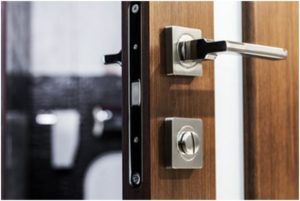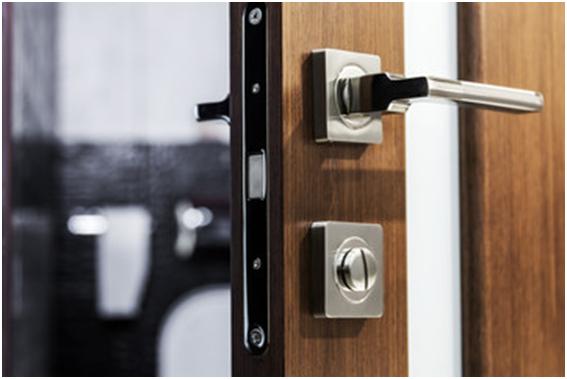The conveniences of keyless locks are numerous. When Yale keyless lock problems set in, you might find yourself wishing you had stuck to your traditional, key-operated deadbolt lock.
I have installed lots of smart locks in homes and commercial buildings. Every so often I get complaints from clients saying their smart locks are driving them crazy because they are not working properly. What are some common issues in Yale keyless locks?
Image courtesy of Pixabay

The technology behind keyless door locks in not new. Remote keyless systemshave been used on cars for many years. This is what is used to allow car owners lock and unlock their doors from afar using a remote. After many years of improvement, these locks have been modified for use in residential properties.
Benefits of Keyless Locks
The primary benefit of a keyless systemis elimination of the need fora mechanical key to lock and unlock your door.A keyless system only requires you to enter a pre-set code to open the door. With a traditional key-operated lock, you always have to remember to carry your keys. You also have to remember to keep your keys in a safe place so you don’t lose them or have them get into the wrong hands. For some people, bulging pockets caused by keys is a real drag. Keyless lock systems also allow users to set user codes for temporary users like guests, housekeepers or technicians.
These are some of the benefits manufacturers intended users to enjoy. They are conveniences Yale keyless lock users enjoy when the locks are working properly. What happens when a lock fails to work as it should? What inconveniences are users forced to contend with?
Yale Keyless Lock Problems
Let’s look specifically at problems in the Yale Assure smart lock. This lock is designed to give users standard keyless lock conveniences like ability to set user codes and automatic one-touch locking. In addition to this, the smart lock allows users to operate the lock using a smart home application on their smartphone. These are some common Yale keyless lock problems.
Bluetooth Connectivity Failure
The Yale Assure lock advertises Bluetooth connectivity which allows you to manage locking and unlocking using the Yale connect app on your phone. Some users say they are unable to pair the lock to their phones. Without this the user cannot operate the lock using their phone, therefore eliminating the top convenience of the lock.
Wrong Lock Status Reports
Smart locks send lock status reports to a smart home hub. This is basically a report on whether the lock is in a locked or unlocked position at the time. Some users of this lock say they consistently receive wrong lock status reports. Even when the lock is in a locked position, it still displaysan ‘unlocked’ status. Z-wave experts have tried to explain this malfunction. They say it could be caused by one of two reasons.
- A weak Z-Wave network: If this network is not strong enough, it cannot properly ping the lock. The suggested solution is to re-position the hub.
- A faulty Z-Wave module: This means it cannot send an accurate lock status to the hub.
Varying Z-Wave Standards around the World
Z-Wave operates on different standards in different countries. There are different frequencies used in various regions around the world. These are some frequencies used in different regions.
- 4; 919.8 in Malaysia, Australia and New Zealand.
- 4; 916 in USA, The Bahamas, Mexico, Jamaica, Barbados, Bermuda.
- 4 in South Africa, China and Singapore.
If the Z-Wave signal cannot reach the hub because it is blocked by walls and furniture in the house, the obvious solution is to buy a Z-Wave network extender to boost the signal. Sounds quite straight forward right? Challenges faced by some users come about when a user purchases their lock and hub from USA for instance and wants to use it in Hong Kong for example. If the Z-Wave signal is weak, a network extender purchased in Hong-Kong cannot be used with the American hub he has because of varying frequencies.
Jamming Bolt
Other users of this Yale smart lock say they have sometimes been locked out of their own homes because of this issue. What happens is that the bolt fails to retract to unlock the door even when a correct user PIN code is entered. “At first I blamed myself because I was sure I had got the code wrong” says one user. After confirming that he had the right user code, he was sure that the lock was faulty.
Final Words
A keyless smart lock can be immensely convenient when it works well. When it fails it can cause you much more stress than you ever experienced in the many years you used a traditional deadbolt. When Yale keyless lock problems set in, you are likely to find yourself doing a lot of troubleshooting and frequentresetting of the lock. If these techniques fail, contact the Yale support team for advice. If your warranty is valid, you may be able to get a replacement.
FAQ
I keep seeing a Z-wave logo on smart lock boxes. What does it mean?
Z-wave is a wireless communication system used in home automation. The system allows interconnection between devices in a smart home. Devices such as light bulbs, heating controls and locks are connected through Z-Wave.
I only use Bluetooth connectivity to operate my lock. Can someone else connected to Bluetooth and hack my lock?
Bluetooth security carries out encryption, authorization and authentication processes to keep your data private. Only authorized people have access to your device.
I have lost my phone. It is paired to my smart lock at home. What should I do?
You can move your account from one phone to another or manage your account from another compatible device. If you feel your phone may be compromised, delete your mobile keys.
Can I use my Assure smart lock with Bluetooth with any mobile phone?
It can only be used with Android phones with operating system 4.3 or anything more recent. For iPhones you need operating systemi0S9 or anything later than that.

